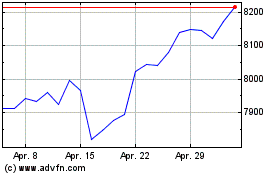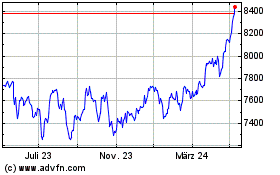Stocks Pare Losses After Iranian Strike Roiled Markets -- Update
08 Januar 2020 - 10:31AM
Dow Jones News
By Anna Hirtenstein and Joanne Chiu
Tehran's military response to the U.S.'s killing of a key
Iranian general rattled markets, but the moves in stocks, bonds,
and commodities quickly moderated as investors reassessed the
chances of a broader conflict.
Late Tuesday, the Pentagon said Iran fired missiles at bases in
Iraq where U.S. troops are stationed. Iran's Islamic Revolutionary
Guard Corps said the attacks were retaliation for the killing last
week of Maj. Gen. Qassem Soleimani.
Iran's foreign minister said the country had taken
"proportionate measures in self-defense" and didn't seek escalation
or war.
On Twitter, President Trump said "All is well!" adding,
"Assessment of casualties & damages taking place now. So far,
so good!"
Global stocks slid moderately, with the Stoxx Europe 600 losing
0.5% and the U.K.'s FTSE 100 down 0.6%. U.S. futures pared losses,
with securities tied to the S&P 500 down 0.2%, after falling as
much as 1.7%.
Japan's Nikkei 225 closed 1.6% down after trading as much as
2.6% lower. Indexes in Hong Kong and South Korea both narrowed
losses to around 1%.
"The price action in the financial markets post the attack also
gave a feeler that markets might not be expecting an all-out
confrontation," said Jim Reid, a multiasset research strategist at
Deutsche Bank.
Brent crude, the global oil benchmark, added 1.1% to $69.02 a
barrel, after spiking to as high as $71.75.
Suhail al-Mazroui, the energy minister of the United Arab
Emirates, said oil producers would respond to any supply shortages,
but that disruptions weren't likely and the option wasn't being
currently discussed by the Organization of the Petroleum Exporting
Countries.
"We are not forecasting any shortage of supply unless there is a
catastrophic escalation which we don't see," Mr. al-Mazroui
said.
Francis Lun, chief executive officer at Geo Securities in Hong
Kong, said an initial knee-jerk reaction had partly reversed.
"Some investors believe Trump might not be able to gather enough
support to escalate the tensions further," he said.
Daryl Liew, head of portfolio management at REYL Singapore, said
the situation was worsening and was unlikely to be resolved soon.
But he added: "I don't think it's in the interests of the U.S. to
escalate this into a full-blown war in an election year."
Rallies in government bonds and gold, two assets that tend to
gain in times of stress, lost steam. The yield on the benchmark
10-year Treasury note declined 0.03 percentage points to 1.8%, up
from a low of 1.7%. Yields fall as prices rise.
Gold stood 1% higher at $1,590.40 an ounce, after briefly
topping $1,600 for the first time since April 2013.
Stefan Hofer, chief investment strategist at LGT Bank, said
higher oil prices could slow global growth.
"Rising oil prices is a tax on consumption," he said, adding
that investors should accumulate gold partly as a hedge against
geopolitical events.
Xie Yu contributed to this article.
Write to Anna Hirtenstein at anna.hirtenstein@wsj.com and Joanne
Chiu at joanne.chiu@wsj.com
(END) Dow Jones Newswires
January 08, 2020 04:16 ET (09:16 GMT)
Copyright (c) 2020 Dow Jones & Company, Inc.
FTSE 100
Index Chart
Von Mär 2024 bis Apr 2024

FTSE 100
Index Chart
Von Apr 2023 bis Apr 2024
